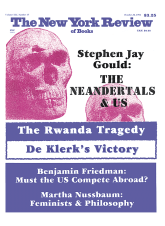To the Editors:
In June, the Indonesian government banned three weekly news magazines, Tempo, De Tik, and Editor. The reason seems to have been that the magazines had been pursuing, to the embarrassment of the government, an issue that had arisen between two of its ministers. One, the minister for science and technology Mr. B.J. Habibie, has close links with Germany and had been the prime mover in the purchase by Indonesia of thirty-nine warships, formerly belonging to the East German Navy. The other, the finance minister Mr. Ma’rie Mohammad, had been critical of the purchase.
A clear issue of freedom of the press arises. All media outlets in Indonesia operate under forms of censorship that would not be tolerated in a country with a genuinely free press. The Indonesian press is relatively tame. Even so, the government closed down three magazines for doing no more than their job of exposing existing differences within the government over an issue that involves major public expenditure.
The founding editor-in-chief of Tempo is Goenawan Mohammad, a poet and essayist, and one of only three Indonesians to be awarded a Nieman Fellowship at Harvard. In the 1960s, he fell foul of the cultural commissars around Sukarno and was one of the young writers who helped to usher in the New Order of President Suharto. In a foreword to a selection of his weekly columns from Tempo, published this month in Australia, I commented as follows on his views:
It may seem ironic on the surface that Goenawan has been proscribed by the government he helped to bring to power, but the irony will not be apparent to him. He knows that the freedom to think and write is always a threat to authority, whether authority is slanted to the left or to the right. He knows that in Indonesia’s case authority has developed over many years, before and after independence, a web of considerable power, including traditional respect for authority itself, legal constraints, commercial corruption and the use of political threats which makes it doubly difficult to think and write freely.
The right to publish in Indonesia is controlled by the government. Licenses are issued to persons who are held responsible for what is published. These licenses have been withdrawn from the responsible persons in the case of the three magazines. However, at least in the case of Tempo, which is a highly successful and therefore profitable venture, Goenawan Mohammad and other owners are under pressure to sell their equity to new owners who are acceptable to the government. So what is taking place is not just an effort to close down a magazine but a cynical political exercise intended to republish it with a different, more sympathetic, owner.
The present owners have so far refused to sell, but the pressure is intense, jobs are at stake, as well as the future of a magazine which since its inception in 1971 has set standards for modern journalism in Indonesia. Goenawan Mohammad has counter-attacked by setting up an association of journalists as a rival to the officially sanctioned journalists’ union. He is also taking the government to a legal tribunal which deals with administrative decisions, claiming that the closure is illegal.
There is no need for me to argue the case for a free press to readers of the New York Review of Books. Instead, I would draw attention to a couple of considerations of timing.
One is that Indonesia, despite the military influence in government and the persistence of difficult international issues, such as East Timor, has opened up its economy and its society considerably. The closing of the three magazines comes at a critical time, when these gains in openness could be lost because of political jockeying for succession to the presidency over the next couple of years. Mr. Suharto is seventy-three years old and has been president since 1966, when he took over from President Sukarno after a violent and bloody upheaval. The coming succession is important for Indonesia’s future stability. The prospects are not encouraging.
The other is that in November this year, Indonesia will be host to an important international event, when leaders of the Asia Pacific Economic Conference (APEC), including President Clinton, meet in Bogor, near Jakarta. Resistance to the closing of the three journals has been stronger than expected in Indonesia, partly no doubt in the hope that the government will be forced to react before the international media arrives for the APEC conference.
The case of China shows how difficult it is to maintain pressure for freedom to publish in the face of self-serving political pronouncements that what people want is not freedom of the press but economic progress and therefore jobs. In fact, of course, these are mutually supportive, not in conflict. In Indonesia’s case, it is not difficult to show that freedom to publish has been an essential part of the economic progress that has been made and that by closing down a magazine of quality like Tempo, the authorities are shooting themselves in the foot.
Friends of Indonesia, as well as friends of a free press, are therefore encouraged to make their voices heard on this crucial matter. They can write to President Suharto at: Istana Merdeka, Jakarta, Indonesia.
Bruce Grant
Melbourne, Australia
This Issue
October 20, 1994



